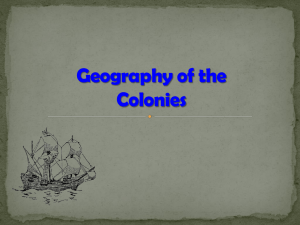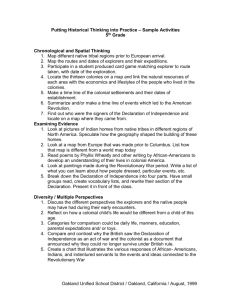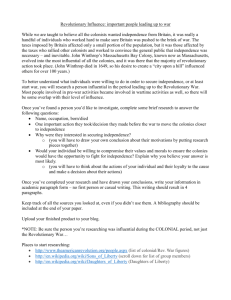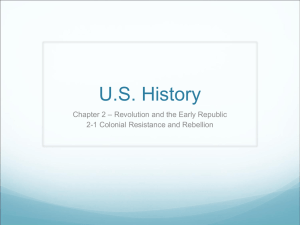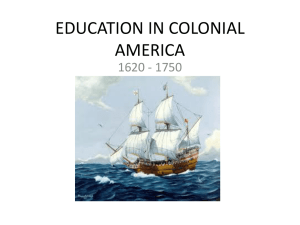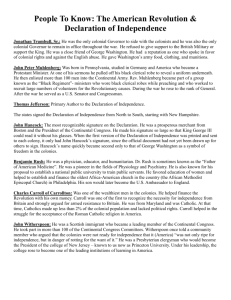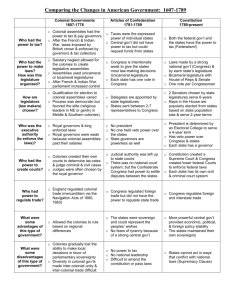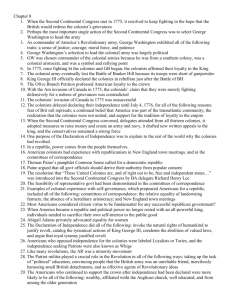Revolution Study Guide
advertisement
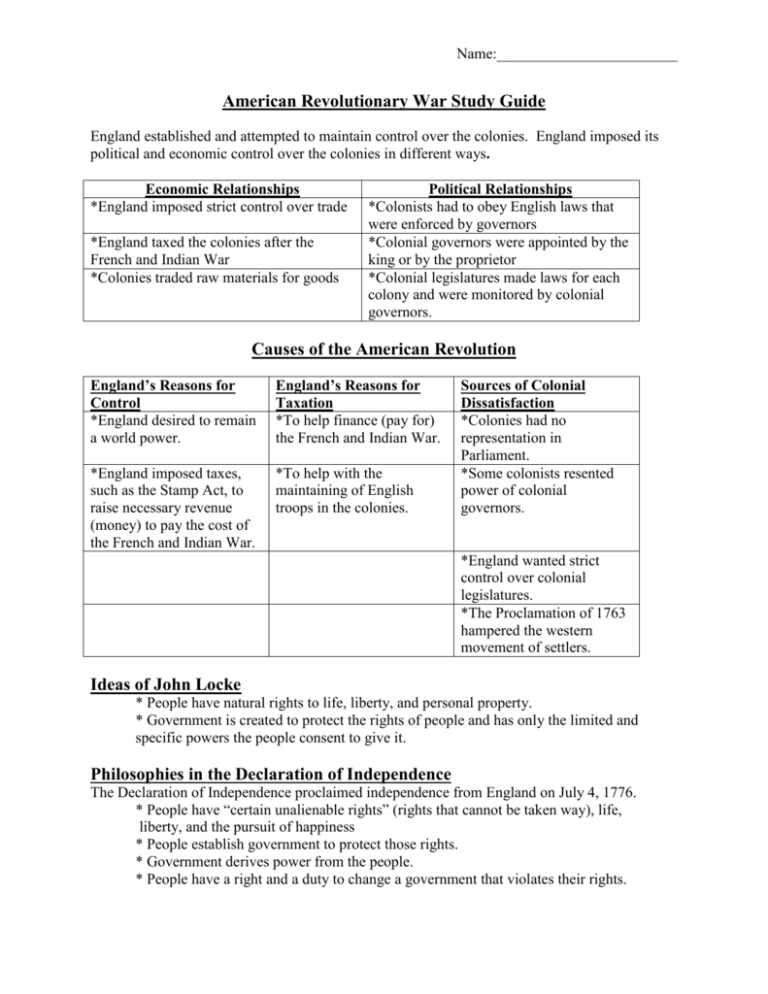
Name:________________________ American Revolutionary War Study Guide England established and attempted to maintain control over the colonies. England imposed its political and economic control over the colonies in different ways. Economic Relationships *England imposed strict control over trade *England taxed the colonies after the French and Indian War *Colonies traded raw materials for goods Political Relationships *Colonists had to obey English laws that were enforced by governors *Colonial governors were appointed by the king or by the proprietor *Colonial legislatures made laws for each colony and were monitored by colonial governors. Causes of the American Revolution England’s Reasons for Control *England desired to remain a world power. England’s Reasons for Taxation *To help finance (pay for) the French and Indian War. *England imposed taxes, such as the Stamp Act, to raise necessary revenue (money) to pay the cost of the French and Indian War. *To help with the maintaining of English troops in the colonies. Sources of Colonial Dissatisfaction *Colonies had no representation in Parliament. *Some colonists resented power of colonial governors. *England wanted strict control over colonial legislatures. *The Proclamation of 1763 hampered the western movement of settlers. Ideas of John Locke * People have natural rights to life, liberty, and personal property. * Government is created to protect the rights of people and has only the limited and specific powers the people consent to give it. Philosophies in the Declaration of Independence The Declaration of Independence proclaimed independence from England on July 4, 1776. * People have “certain unalienable rights” (rights that cannot be taken way), life, liberty, and the pursuit of happiness * People establish government to protect those rights. * Government derives power from the people. * People have a right and a duty to change a government that violates their rights. Name:________________________ Key individuals King George III: British king during the Revolutionary era Lord Cornwallis: British general who surrendered at Yorktown John Adams: Championed the cause of independence George Washington: Commander of the Continental Army Thomas Jefferson: Major author of the Declaration of Independence Patrick Henry: Outspoken member of House of Burgesses; inspired colonial patriotism with “Give me liberty or give me death” speech Benjamin Franklin: Prominent member of Continental Congress; helped frame the Declaration of Independence Key Events Boston Massacre: Colonists in Boston were shot after taunting British soldiers. Boston Tea Party: Samuel Adams and Paul Revere led patriots in throwing tea into Boston Harbor to protest tea taxes. First Continental Congress: Delegates from all colonies except Georgia met to discuss problems with England and to promote independence. Battle of Lexington and Concord: This was the site of the first armed conflict of the Revolutionary War. Approval of the Declaration of Independence: Colonies declared independence from England (July 4, 1776). Battle of Saratoga: This American victory was the turning point in the war. Colonial advantages They were fighting for their homes, families, lives, and freedom. George Washington’s leadership ability They were fighting on their home ground. Ben Franklin got the French to help them. Many of the English generals were afraid to make mistakes. The English people would get tired of a long war. Colonial disadvantages Poorly trained army and no navy. No money to fight a war. Weak, inexperienced gov’t. 2/3 of population were either Tories or didn’t care. Professional English army, Hessians and Indians against them Poor equipment and lack of food Soldiers could leave at will. Name:________________________ British advantages Professional army and navy. Factories to make war materials. $ to feed and supply an army. A government to make decisions. 1/3 of the American population were Tories (Loyalists) and 1/3 were neutral Hessians and Indians on British side. Americans were poorly supplied and trained. British disadvantages England had a 3000 mile supply line. English soldiers were fighting because they were told to fight. America is a large piece of land and not easy to control or conquer. Many of the English generals were afraid to make mistakes




